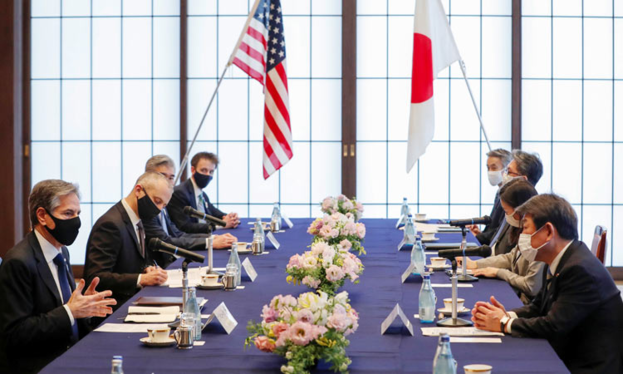Input 2021.03.17 13:38
The meeting held in Tokyo, Japan, was attended by US Secretary of State Tony Blincoln, Defense Minister Lloyd Austin, Japan’s Foreign Minister Toshimitsu Motegi and Defense Minister Nobuo Kishi. The US-Japan 2+2 meeting is two years since April 2019. The meeting between the US and Japan is significant in that it is the first alliance diplomacy of the Biden administration, which took place prior to the ROK-US Foreign Affairs and Defense Ministers’ Meeting (17-18) and high-level US-China talks (18-19).

The two countries also reaffirmed that the Senkaku Islands (Chinese name Diaoyudao) are subject to Article 5 of the US-Japan Security Treaty, which stipulates US defense obligations in Japan. In particular, the United States emphasized that it has a firm will to defend Japan by mobilizing all its capabilities, including nuclear weapons, and said that it would contribute to establishing an international order based on the’free and open Indo-Pacific’.
Both countries pointed out the threat that China poses to the maintenance of the Taiwan Strait status and raised objections to China’s illegal occupation of the South China Sea. China claims sovereignty over 90% of the seas in the South China Sea based on the maritime boundary line, “Namhae Ninth Line,” and has a military outpost on an artificial island. In this regard, the Permanent Arbitration Tribunal (PCA) in The Hague, Netherlands, in its ruling on the dispute over territorial rights in the South China Sea between China and the Philippines in July 2016, determined that China’s claim of “historical rights” has no legal basis, and that China has infringed on the sovereignty of the Philippines. There is a bar.
At an interview after the meeting, Minister Blincoln warned that “if China uses coercion and aggression means to get what it wants, it will push back as necessary.” He added, “The Indo-Pacific region is a geographically important place. We must obtain security guarantees for all by presenting a common concept in a strong form with our friends and allies,” he said. I want to convey,” he added.
The direct mention of China in this statement by the two countries is interpreted as evidence that the border between the United States and the United States looking at the rise of China has grown that much. The two countries previously omitted the country for fear of overstimulating China in the joint presentation of the 2+2 conference in 2019. At the Quad summit of the four security councils in the United States, Japan, Australia and India held on the 12th, they expressed their concerns about China only indirectly.

It cannot be overlooked that the US side is making more efforts to cooperate with Japan while expressing the importance of the trilateral cooperation between Korea, the United States and Japan. After the inauguration, the Biden administration, which chose Japan as the first net prevention of ministerial personnel after making normal calls with the Japanese side first and agreeing to extend the special defense cost agreement. It seemed to be shrinking. Regarding the denuclearization of North Korea, Minister Blincoln said that he had been talking with Foreign Minister Motegi and South Korean counterparts.
Meanwhile, China dismissed the joint statement issued by the United States and Japan as “surprisingly groundless accusations.” China’s state-run Global Times reported on this day, citing remarks by Chinese experts, saying, “Most of the frictions in the Indo-Pacific region are caused by provocations from the United States and allies.”
Luxiang, an American expert at the Chinese Academy of Social Sciences, told the Global Times, “The joint statement between the United States and Japan is as vague and not surprising as expected.” He pointed out that there is practically nothing that the United States and Japan can do because they are already patrolling the area on a regular basis.”
Jin Chan-Long, vice president of the People’s University International Relations Institute of China, argued that the actions of the United States and Japan “do not conform to the current international order,” and that “all changes in the region were triggered by provocations of the United States and its allies, partners or puppets.” He also said, “All issues from the South China Sea to Taiwan, Diaoyudao, etc. are related to China’s sovereignty and core interests,” he said. “The U.S.-Japan cooperation should help promote mutual understanding and trust between countries, peace and stability in the Asia-Pacific region, but third countries It should not damage the profits of the company,” he said.
